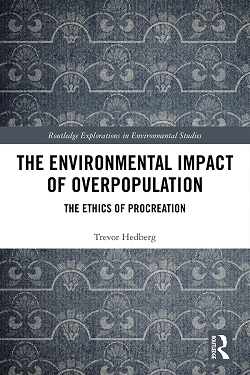Current Academic Research
Most of my philosophical research focuses on the ways in which recent technological advancements have created new and pressing moral problems. Climate change, which results from using fossil fuels to produce energy, has been one of most consistent research areas. The other has been the connection between human population size and environmental impact. I have devoted one book and several articles to assessing how reducing human population size could play a role in reducing reducing humanity's environmental impact.
Beyond my work on overpopulation, I have investigated various other issues in ethics and epistemology. These topics include (among others) the ethics of targeting vulnerable groups with marketing campaigns, the strength of our moral duties to wild animals and domestic animals, the rationality of not caring whether or not God exists, and the existence of epistemically supererogatory actions. (An epistemically supererogatory action is, roughly, an action that is epistemically good to do but not required by any epistemic duty.)
I have highlighted some of my current research topics below, and you can check out my Publications and Vitae for further information on my past work.
Environmental Ethics and Global Population Growth
If you visit a webpage with a world population clock, you'll quickly notice two things: global human population is greater than 8 billion, and it is still steadily growing. Until recently, the dominant thought with respect to global population was that it would peak at about 9 billion in 2050 and stabilize or perhaps begin to decline, but recent projections from the United Nations and from other experts suggest that population stabilization may not occur this century at all. We could have a global population of greater than 11 billion by 2100 in some scenarios.
Serious talk about population growth is often avoided, however. Discussing the issue brings to mind worries about forced abortions and mandatory sterilizations – severe infringements on reproductive freedom that are generally regarded as morally abhorrent. There is no doubt that taking population seriously requires directly addressing the conflict between promoting a sustainable population and promoting procreative liberties, and given the severity of the problems to which population growth contributes (such as climate change, biodiversity loss, and resource depletion), it's quite possible that no tidy resolution to this conflict will be forthcoming. But that's hardly an excuse to ignore the problem or act as if the carrying capacity of the Earth is infinite. Some recent contributions to academic philosophy, such as the collection Life on the Brink and Sarah Conly's One Child, indicate that philosophers are starting to share this sentiment.
 In The Environmental Impact of Overpopulation: The Ethics of Procreation (Routledge, 2020), I address the difficult moral question of what we ought to do – both collectively and as individuals – in response to rising global population.
Although I do engage with some of the traditional issues in population ethics, such as the non-identity problem, my main aim is to craft moral principles that can help us respond appropriately to our actual population
problem in light of the empirical facts about it. One of the book's guiding themes is that responding adequately to overpopulation requires a long-term focus: we must take seriously the equal moral status of those
who will not be born for centuries or even millenia. Taking the moral status of future people seriously means, among other things, that we should pursue lasting solutions to these problems rather than those that will only
prove satisfactory for the next few generations. Unfortunately, developing such a long-lasting solution to the population problem without compromising other crucial moral values is no easy task.
In The Environmental Impact of Overpopulation: The Ethics of Procreation (Routledge, 2020), I address the difficult moral question of what we ought to do – both collectively and as individuals – in response to rising global population.
Although I do engage with some of the traditional issues in population ethics, such as the non-identity problem, my main aim is to craft moral principles that can help us respond appropriately to our actual population
problem in light of the empirical facts about it. One of the book's guiding themes is that responding adequately to overpopulation requires a long-term focus: we must take seriously the equal moral status of those
who will not be born for centuries or even millenia. Taking the moral status of future people seriously means, among other things, that we should pursue lasting solutions to these problems rather than those that will only
prove satisfactory for the next few generations. Unfortunately, developing such a long-lasting solution to the population problem without compromising other crucial moral values is no easy task.
With all that in mind, I argue that there are a number of morally permissible measures that we can take to reduce global population in the long term and that doing so is a moral requirement. I also address the broader relationship between the environmental impact of people's actions and the ethics of procreation more generally. I have refined my thoughts on the issue a bit in the years that have passed since the book's publication. If you visit the Media page, you can hear me discuss some of my more recent thoughts on these topics podcast appearances that took place after 2020. You can also consult some book reviews for additional perspectives on the text. Phil Cafaro reviewed the book for Biological Conservation in late 2020, and Eileen Crist reviewed it more recently for Environmental Ethics.
Compensating Future People for Biodiversity Loss
One of the most significant environmental crises of the 21st century is the accelerated rate at which nonhuman species are going extinct. This biodiversity loss results from habitat destruction, climate change, poaching, and various other environmentally destructive human activities. The world that future generations inherit will be one that is far less biologically diverse than the one we currently inhabit. Typically, when we cause harm to someone else, we have a duty to compensate them for the harm they have suffered. Thus, I'm interested in considering the possibility that we have an obligation to compensate future people for biodiversity loss. We may have the technology in the future to resurrect extinct species or to create new species with similar appearances and ecological niches to old species. Could this serve as a means of compensation for future generations – a means of undoing some of the biodiversity loss that we have caused? And if so, is pursuing this research a moral obligation? I'm trying to pin down the answers in one of my current papers.
Human Enhancement
One of the courses I taught regularly at Ohio State was a survey course about the ethics of human enhancement. Teaching this class has made me curious about a number of moral issues in this area. Is there any good reason to prohibit athletes from using performance enhancing drugs? Should universities ban students from non-prescription use of cognitive enhancing drugs? Do mood enhancing drugs, such as psilocybin, threaten to undermine a person's identity, and if so, does that provide a good moral reason to restrict the therapeutic use of these drugs?
Lately, I have been focusing on whether it is morally permissible for otherwise healthy students to use cognitive-enhancing drugs like Adderall to improve their academic performance. Some institutions of higher education, such as Duke University, have explicitly prohibited this behavior in their codes of academic conduct, and it is currently illegal in the United States to possess these drugs without a prescription. However, I am skeptical that there exist any compelling moral reasons to prohibit adults from using these substances. I am also looking to connect my research on overpopulation and sustainability to life-extension. In the not-so-distant future, certain medical treatments or drugs may enable us to extend the human lifespan significantly by halting or countering the effects of aging, but one result of doing this would to increase the number of generations that coexist simultaneously. This would significantly increase the number of people on the planet unless norms concerning procreation changed dramatically. Yet the benefits of anti-aging enhancement could lead to substantial improvements in human welfare and a reduction of trillions of dollars in healthcare costs. I'm curious how anti-aging enhancements might be developed while simultaneously pursuing a population size that is environmentally sustainable.
